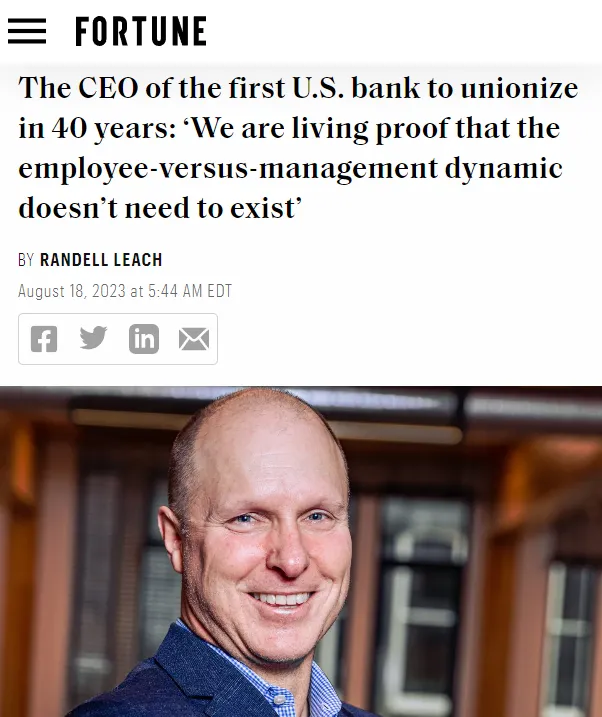The CEO of the first U.S. bank to unionize in 40 years: ‘We are living proof that the employee-versus-management dynamic doesn’t need to exist’

This article originally appeared in Fortune:
Unionization has been making headlines lately, with highly visible organizing efforts at some of the nation’s most well-known companies. These stories tend to capture an antagonistic relationship between employer and employee, exacerbated by union-busting tactics and us-versus-them narratives.
As the CEO of the first U.S. bank to unionize in over 40 years, I learned firsthand that it doesn’t need to be this way. In fact, if business leaders want happy employees and good business outcomes, they’ll need to embrace a more collaborative and compassionate approach–one centered on worker empowerment.
The Communication Workers of America approached Beneficial State Bank in 2019, seeking to represent the employees of a mission-driven bank that fostered an environment of employee engagement and collaboration. From the outset, bank management agreed to remain neutral during the organizing process and voluntarily recognize the union if adopted. While we didn’t know then if unionization was the right choice for our employees, we chose to stand by our commitment to worker empowerment and self-determination to let them decide.
Over 100 Beneficial State Bank employees joined the union in March 2020, and we reached an agreement soon after. Rather than thinking in terms of winners and losers, we saw this as yet another opportunity to empower our workers. We’re glad to demonstrate that the classic dynamic of workers versus management doesn’t have to exist–it can be workers and management collaborating to work toward a shared goal.
Unfortunately, it’s not common for banks to give their employees a safe and powerful platform from which they can speak and truly be heard by management. Profits and shareholder desires are often prioritized over the needs of employees, many of whom deal with stressful conditions and low wages. The median pay for bank tellers in the U.S. is just over $17 an hour–so low that 31% of bank employees surveyed in one study rely on some form of government assistance.
Meeting the needs of employees does not need to result in conflict, even when unionization is involved. Employers, particularly in the banking industry, have an opportunity to engage their employees to create a better workplace and produce better outcomes for the business and its customers.
A culture of worker empowerment promotes higher engagement levels which can lead to greater productivity and a higher quality of work, according to Gallup’s research. It was also found that organizations with the highest levels of employee engagement achieve earnings-per-share growth that is more than four times that of competitors. Higher wages are also associated with better business outcomes. To achieve this, employers need to provide channels and forums for employees to come together, hear each other, and weigh their needs against the long-term needs of the larger organization, whether they are unionized or not. At Beneficial State Bank, we have prioritized this approach from the start, with union-represented and unrepresented employees alike.
Any form of employee engagement and collaborative problem-solving takes a great deal of time and effort. However challenging, it’s extremely rewarding to build a company that meets the needs of both management and workers. While unionization may not be the solution for every business, every business can benefit from investing time and resources in elevating the needs and concerns of those who make our businesses run, deliver, and succeed.
Randell Leach is the CEO of Beneficial State Bank.
The opinions expressed in Fortune.com commentary pieces are solely the views of their authors and do not necessarily reflect the opinions and beliefs of Fortune.
PRESS RELEASE: Communications Workers of America File ULP Against Wells Fargo for Refusing to Bargain with First Non-Branch Unit
Wells Fargo union accuses the bank of 'unlawful' tactics
Wells Fargo Bargaining Update: Rounds 1, 2, & 3


